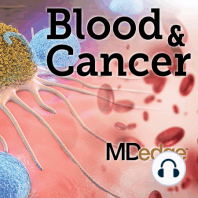25 min listen

Post-HSCT care at home: Can maintaining the patient’s microbiome prevent GVHD, improve other outcomes, decrease costs, and reduce the risk of COVID-19…
FromBlood & Cancer
Post-HSCT care at home: Can maintaining the patient’s microbiome prevent GVHD, improve other outcomes, decrease costs, and reduce the risk of COVID-19…
FromBlood & Cancer
ratings:
Length:
28 minutes
Released:
Nov 12, 2020
Format:
Podcast episode
Description
Can receiving all posttransplant care at home benefit patients undergoing hematopoietic stem cell transplant (HSCT)? Researchers are conducting phase 2 trials to find out. Anthony D. Sung, MD, of Duke University School of Medicine, described this research to host David H. Henry, MD. Dr. Sung outlined the process of receiving post-HSCT care at home and discussed Duke's clinical trials assessing the impact of home care on costs, quality of life, the microbiome, and graft-versus-host disease (GVHD). Dr. Sung also discussed another Duke trial investigating whether a probiotic can prevent COVID-19. Post-HSCT care at home: How it works Cell collection (if applicable), conditioning, and HSCT all take place in the outpatient setting. From day 1 after transplant onward, the patient receives all care at home. A nurse practitioner or physician assistant visits the patient every morning to draw labs, which are run at the hospital. A nurse visits every afternoon to give the patient supportive care. Patients are given the tools to video chat with physicians. Patients must live within 1 hour of Duke’s transplant center or relocate to furnished apartments near the transplant center. Phase 1 trial: Feasible and safe Dr. Sung and colleagues have completed a phase 1 trial, which suggested that post-HSCT care at home was feasible and safe. Outcomes were similar to outcomes in patients who do not receive post-HSCT care at home. The results were presented at ASH 2017 (Blood. 2017;130:745; https://bit.ly/2UelgVo). Phase 2 trials: Microbiome, GVHD, and other outcomes With one phase 2 trial (NCT01725022), Dr. Sung and colleagues aim to determine if: Patients can maintain their normal bowel microbiota by receiving post-HSCT care at home, as opposed to outpatient or inpatient care. Treatment-related morbidities and mortality are similar between the groups. Care at home improves quality of life and reduces costs. Trial details can be found here: https://bit.ly/2JRnY0Y. In the other phase 2 trial (NCT02218151), the main goal is to compare the incidence of grade 2-4 acute GVHD at 6 months in patients receiving care at home vs. inpatient or outpatient care. The theory is that maintaining the microbiome will reduce the risk of GVHD. A case of GVHD can add $100,000 to the cost of care, Dr. Sung noted. Trial details can be found here: https://bit.ly/32vr8y3. COVID-19 and the microbiome Dr. Sung and colleagues are also conducting a trial of Lactobacillus rhamnosus GG (LGG) as prophylaxis for COVID-19 (NCT04399252). Research has shown that giving LGG to mice with Pseudomonas aeruginosa pneumonia can: Help prevent lung injury and significantly improve survival (Shock. 2013;40[6]:496-503; https://bit.ly/3khQBRr). Help modulate the microbiome and immune system, leading to decreased inflammation, TNF-alpha, IL-2, and IL-6, as well as increased regulatory T cells (Clin Nutr. 2017;36[6]:1549-1557; https://bit.ly/35lENJZ). Dr. Sung noted that TNF-alpha, IL-2, and IL-6 have also been implicated in COVID-19 and associated with increased lung injury. Dr. Sung and colleagues have theorized that LGG could decrease lung injury and the symptoms of COVID-19 and perhaps even prevent COVID-19. The researchers are conducting a randomized trial of LGG in household contacts of patients with COVID-19 (https://bit.ly/2GRSC9x). For more details on the trial, email protect-ehc@duke.edu or visit https://bit.ly/2IsLjWh. Disclosures: Dr. Sung and Dr. Henry have no relevant disclosures. Duke's transplant trials are funded by grants from the National Institutes of Health. Funding for the COVID-19 trial is provided by the Duke Microbiome Center and philanthropic giving. The LGG and placebo used in the trial are provided by DSM. * * * For more MDedge podcasts, visit mdedge.com/podcasts Email the show: podcasts@mdedge.com Interact with us on Twitter: @MDedgehemonc David Henry on Twitter: @davidhenrymd
Released:
Nov 12, 2020
Format:
Podcast episode
Titles in the series (100)
Practice-changing research in GI cancer: , of the University of Pennsylvania, Philadelphia, joins Blood & Cancer host , also of the University of Pennsylvania, to review the top three GI cancer trials presented at the 2019 ESMO World Congress on Gastrointestinal Cancer, and how they are... by Blood & Cancer